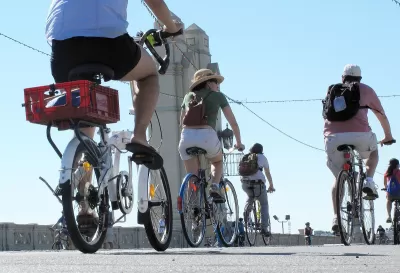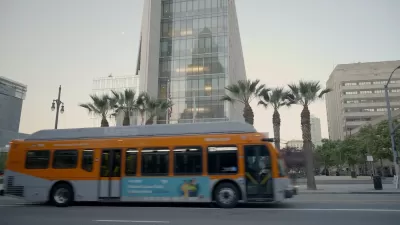Despite the program’s success across the region and rising production costs, Los Angeles-area events could receive less funding in the coming year.

In an opinion piece in Streetsblog LA, Wes Reutimann, Special Programs Director and co-founder of the Pasadena Complete Streets Coalition and ActiveSGV, praises the region’s expansive Open Streets program, which includes events like CicLAvia and Beach Streets that have grown in size and scope since they first launched in 2010.
“Beloved by local families and Angelenos from all walks of life, these family-friendly experiences provide the public with a fleeting snapshot of what a more sustainable, multi-modal Southern California could look like.” So, Reutimann asks, why is LA Metro proposing slashing open streets funding by as much as 40 percent? Reutimann points out that the cost of producing events is rising, with insurance costs and safety considerations adding significant costs that will be hard to make up through private sponsorship.
Reutimann argues that “The value of Open Streets has never been greater,” bringing together community and helping California promote multimodal, sustainable transportation. “After a decade, Metro should be sponsoring about one Open Streets event a month, highlighting the county’s rich diversity and its expanding and improving public transit system. The level of continued investment required to reach this goal – just $2-3 million per year above where it is now – is peanuts to an agency that routinely approves cost overruns for highway projects in the tens of millions.”
FULL STORY: Los Angeles Loves “Open Streets” Events – So Why Would Metro Slash Funding?

Trump Administration Could Effectively End Housing Voucher Program
Federal officials are eyeing major cuts to the Section 8 program that helps millions of low-income households pay rent.

Planetizen Federal Action Tracker
A weekly monitor of how Trump’s orders and actions are impacting planners and planning in America.

Ken Jennings Launches Transit Web Series
The Jeopardy champ wants you to ride public transit.

California Invests Additional $5M in Electric School Buses
The state wants to electrify all of its school bus fleets by 2035.

Austin Launches $2M Homelessness Prevention Fund
A new grant program from the city’s Homeless Strategy Office will fund rental assistance and supportive services.

Alabama School Forestry Initiative Brings Trees to Schoolyards
Trees can improve physical and mental health for students and commnity members.
Urban Design for Planners 1: Software Tools
This six-course series explores essential urban design concepts using open source software and equips planners with the tools they need to participate fully in the urban design process.
Planning for Universal Design
Learn the tools for implementing Universal Design in planning regulations.
Ada County Highway District
Clanton & Associates, Inc.
Jessamine County Fiscal Court
Institute for Housing and Urban Development Studies (IHS)
City of Grandview
Harvard GSD Executive Education
Toledo-Lucas County Plan Commissions
Salt Lake City
NYU Wagner Graduate School of Public Service





























